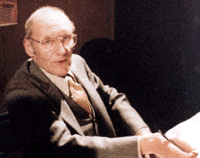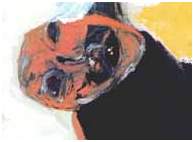
Rob Leventhal
Off the Record and Online
Don van Vliet, Stagecoach to Hell (1985)
The Captain has been an enduring inspiration to me.
 An
Electronic Resumé
An
Electronic Resumé
 Complete
CV
Complete
CV
 Essays
Essays
 Art
Spiegelman's MAUS: Parapraxis, Trauma, and the Holocaust (1997)
Art
Spiegelman's MAUS: Parapraxis, Trauma, and the Holocaust (1997)
 Nietzsche
and Lou Andreas-Salomé: Chronicle of a Relationship 1882 (2002)
Nietzsche
and Lou Andreas-Salomé: Chronicle of a Relationship 1882 (2002)
 Narcissism,
Masochism, and Love after the Holocaust:
Narcissism,
Masochism, and Love after the Holocaust:
Paul Mazursky's Film Enemies, A Love Story(1996)
 Romancing
the Holocaust, or Hollywood and Horror:
Romancing
the Holocaust, or Hollywood and Horror:
Steven Spielberg's Schindler's List (1996)
 Believe
the Unbelievable: The American Response to the Nazi Genocide of the Jews,
1933-1945 in Historical Context (1999)
Believe
the Unbelievable: The American Response to the Nazi Genocide of the Jews,
1933-1945 in Historical Context (1999)
Responses
to the Holocaust and Genocide:
A Hypertext Archive for the Humanities
 In
an essay just published (with Volker Kaiser), "Rewiring the Oedipal Scene:
Image and Discursivity in Wim Wenders' Journey Until the End of the World"
in: Wilhelm Wurzer, ed., Panorama: Philosophies of the Visible (New
York: Continuum, 2003), we examined the primal scenes of two modern myths
-- psychoanalysis (the Oedipal) and informatics (the Allegory of the Cave)--
and their undoing -- in Wim Wenders' 1992 film Until the End of the World.
In
an essay just published (with Volker Kaiser), "Rewiring the Oedipal Scene:
Image and Discursivity in Wim Wenders' Journey Until the End of the World"
in: Wilhelm Wurzer, ed., Panorama: Philosophies of the Visible (New
York: Continuum, 2003), we examined the primal scenes of two modern myths
-- psychoanalysis (the Oedipal) and informatics (the Allegory of the Cave)--
and their undoing -- in Wim Wenders' 1992 film Until the End of the World. Ink
Mathematics: The Creative Work of Don Van Vliet, Captain Beefheart (in progress)(2002)
Ink
Mathematics: The Creative Work of Don Van Vliet, Captain Beefheart (in progress)(2002) The
Equality of Equals: A Review of Adam Phillips Equals in Culture
Machine: The Ethico-Political Issue Vol. 4 (2002)
The
Equality of Equals: A Review of Adam Phillips Equals in Culture
Machine: The Ethico-Political Issue Vol. 4 (2002) Rewriting
the Disaster: A Review of W.G. Sebald's On the Natural History of Destruction
in: Culture Machine August 2003
Rewriting
the Disaster: A Review of W.G. Sebald's On the Natural History of Destruction
in: Culture Machine August 2003 Figures of Entropy: The Second Law,
Literature, and Psychoanalysis (in progress)
Figures of Entropy: The Second Law,
Literature, and Psychoanalysis (in progress)
Theoretical Influences

Michel Foucault
Individuals live and speak within
a matrix of classification and naming
systems, and also define and constitute themselves within and against such systems
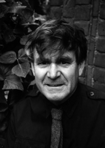
Ian Hacking
"If you can spray it, it's real."
Be careful how you name things, they just might happen!
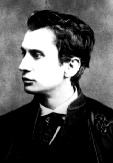 |
|

Review of W.G. Sebald's On the Natural History of Destruction, which you can read at Rewriting the Disaster: A Review of W.G. Sebald's On the Natural History of Destruction in: Culture Machine August 2003

Images and Papers in the History of Computer Technology

 A
German Hollerith Machine, circa 1922
A
German Hollerith Machine, circa 1922 A Scheutz Calculating
Engine
A Scheutz Calculating
Engine Claude
Shannon's A Mathematical Theory of Communication,
Claude
Shannon's A Mathematical Theory of Communication,which first appeared in the June and October 1948 editions of the Bell System Technical Journal (1948)
-- the papers that basically created the first instance of informatics
 The First Digital
Automatic Computer (.gif 43k)
The First Digital
Automatic Computer (.gif 43k)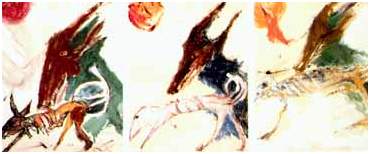
Don Van Vliet, Dylisheus (1984)


Interesting Institutes and Organizations
 InteLex
Corporation, creators of the Past Masters® series of full-text databases
and electronic scholarly
InteLex
Corporation, creators of the Past Masters® series of full-text databases
and electronic scholarlyeditions in the Human Sciences, where I work.
 J.G.
Ballard's Home Page
J.G.
Ballard's Home Page The
Institute for Advanced Technology in the Humanities
The
Institute for Advanced Technology in the Humanities(University of Virginia)
 Postmodern
Culture
Postmodern
Culture CTheory
CTheory

Some pics of instruments and musicians
 My
old guitar (1961 SG)
My
old guitar (1961 SG) Ry Cooder in
concert 1983 (.jpg 33K)
Ry Cooder in
concert 1983 (.jpg 33K) Ry Cooder with
Guitar
Ry Cooder with
Guitar  A great
shot of Wayne Shorter
A great
shot of Wayne Shorter Django
Django Lowell George
circa 1973 (.gif 48k)
Lowell George
circa 1973 (.gif 48k) Frisell Live
Frisell Live Reading
Matter
Reading
Matter
 Culture
Machine
Culture
Machine Slavoj
Zizek's Welcome to the Desert of the Real
Slavoj
Zizek's Welcome to the Desert of the Real Bill
Joy's Why the Future Doesn't Need Us (published in Wired 8.04,
April 2000)
Bill
Joy's Why the Future Doesn't Need Us (published in Wired 8.04,
April 2000) Friedrich
Kittler's brief History of Communication Media (ctheory)
Friedrich
Kittler's brief History of Communication Media (ctheory) Cyberwar,
God, and Television: An Interview with Paul Virilio (ctheory)
Cyberwar,
God, and Television: An Interview with Paul Virilio (ctheory) Laurence
Rickels' Nazi Psychoanalysis (excerpt)
Laurence
Rickels' Nazi Psychoanalysis (excerpt) Friedrich
Kittler's There is no software
Friedrich
Kittler's There is no software Technologies
of Writing/Rewriting Technology: An Interview with Friedrich Kittler
Technologies
of Writing/Rewriting Technology: An Interview with Friedrich Kittler(originally appeared in Auseinander, Vol.1, No.3 [Berlin, 1995])
 ctheory
-- theory, technology, culture
ctheory
-- theory, technology, culture Paul
Virilio's Speed and Information: Cyberspace Alarm
Paul
Virilio's Speed and Information: Cyberspace Alarm Jerome
McGann's Radiant Textuality
Jerome
McGann's Radiant Textuality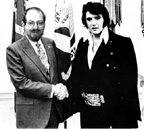
A Rare Moment
